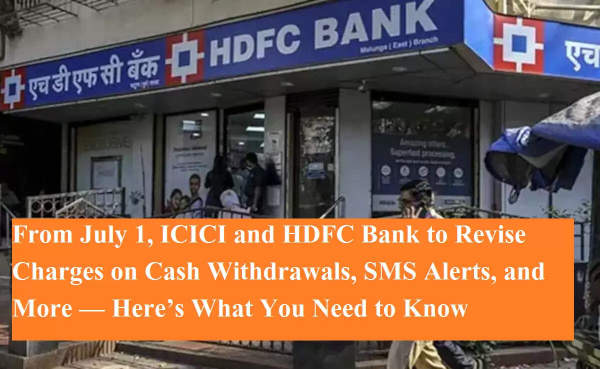
Starting July 1, 2025, two of India’s leading private sector banks — ICICI Bank and HDFC Bank — are implementing changes in their service charge structures. These revisions could directly impact your monthly banking expenses, especially if you frequently use branch services, withdraw cash, or rely on banking notifications. If you have an account with either of these banks, it’s essential to understand what’s changing to avoid unexpected deductions.
💸 What’s Changing from July 1?
Both ICICI Bank and HDFC Bank will be updating charges related to various banking transactions and services, including:
🏧 1. Cash Transaction Limits Slashed
-
For customers in both metro and non-metro cities, the free cash transaction limit is being revised.
-
Once you exceed this monthly limit, banks will impose additional cash withdrawal charges.
-
This applies to cash withdrawals from branches or ATMs beyond the permissible limit.
📩 2. Charges for SMS Alerts
-
SMS alerts for debit/credit transactions, account updates, and OTPs — which were earlier free or nominally charged — will now have updated pricing.
-
Banks may offer bundled packages or charge a flat annual fee for such alerts.
💳 3. Debit Card Services May Cost More
-
Replacements, upgrades, or reissuance of debit cards might come with a higher service fee.
-
Annual maintenance charges on premium cards could also be revised.
🧾 4. New Chequebook Fees
-
Some free chequebooks may now come with a limit on the number of leaves.
-
Requesting additional chequebooks beyond the free quota will result in extra charges per leaf or per chequebook.
💻 5. Digital Transactions Not Spared
-
Certain digital banking services — especially through net banking or mobile banking apps — may now come under the fee bracket.
-
These may include RTGS/NEFT/IMPS transactions above a specific count or value.
📍 Who Will Be Affected?
These changes apply to:
-
Savings account holders, particularly those on basic or regular service tiers.
-
Users exceeding monthly transaction thresholds.
-
Customers relying on physical banking services like branch visits, cheque usage, or cash withdrawals.
However, premium account holders or those under special relationship programs may have relaxed limits or waivers.
🔍 Why Are Banks Updating These Charges?
Banks periodically revise service charges to:
-
Balance operational costs amid rising infrastructure and staffing expenses.
-
Encourage a shift towards digital banking, which is more cost-effective.
-
Disincentivize high-frequency cash transactions, especially at physical branches.
These updates also align with industry practices and regulatory permissions granted to banks for structuring non-interest revenue.
🧠 How to Minimize Banking Costs?
Here are a few practical tips to help you stay within limits and avoid penalties:
-
Go digital: Use UPI, mobile banking, and net banking for transactions.
-
Track your cash usage: Limit branch withdrawals and use ATMs wisely.
-
Subscribe to bank alerts: Be aware of usage thresholds and fee updates.
-
Opt for consolidated service packs: Some banks offer bundled services at discounted annual rates.
-
Maintain minimum balance: To avoid non-maintenance charges and sometimes qualify for fee waivers.
📢 Final Thought
With new service charge policies taking effect from July 1, ICICI Bank and HDFC Bank customers must stay informed and adapt their banking habits accordingly. These changes may appear minor but can add up over months, especially for those frequently using branch-based services or exceeding transaction limits.
By understanding the updated fee structure and making smarter banking choices, you can keep your banking costs in check and avoid unpleasant surprises in your statement.
-
Thane Road Accident: Driver Dies After Losing Control And Overturning Truck; FIR Registered

-
Jordan Spieth facing major Open threat as huge financial consequence lingers

-
Jordan Spieth facing major Open threat as huge financial consequence lingers

-
UK weather maps show barrage of rain hitting England in hours - full list of 25 counties

-
UK weather maps show barrage of rain hitting England in hours - full list of 25 counties
